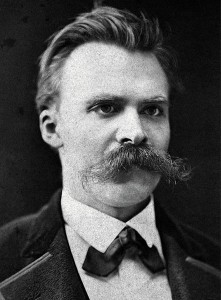Friedrich Nietzsche

Friedrich Nietzsche
by Hartmann, F, used under CC0
Friedrich Nietzsche (1844-1900) was a German philologist, philosopher, and cultural critic who wrote several critical texts on religion, culture, morality, philosophy, and science. He was born in Röcken, the Prussian province of Saxony, and his father died of a brain illness when he was only 5. From an early age, Nietzsche suffered from migraines and varying other mental disorders that troubled him throughout his entire life. He became a professor at the University of Basel where he became the chair of classical philology at the age of 24 (Friedrich Nietzsche Biography, 2012). While there, he wrote a variety of different works all with a common theme. He was very interested and involved in the French Enlightenment which focuses on anti-church and anti-government ideas. Although Nietzsche was forced to retire early due to a brain illness, his work still influenced many notable modern figures such as Andre Malraux, Jean Paul Sartre, and Sigmund Freud.
Most Famous Works:
- The Birth of Tragedy (1872)
- Human, All too Human (1879)
- The Gay Science (1882)
- Thus Spoke Zarathustra (1885)
- Beyond Good and Evil (1886)
- On the Genealogy of Morality (1887)
Sources:
Friedrich Nietzsche Biography. (2012, January). Retrieved from European Graduate School- Graduate and Postgraduate Studies: http://www.egs.edu/library/friedrich-nietzsche/biography/
Hartmann, F. (c. 1875). Friedrich Nietzsche. [Digital Image]. Retrieved from http://commons.wikimedia.org/wiki/File:Nietzsche187a.jpg. Public domain image.
